Baba Osa Meyi: Meaning, Tips, Sayings, Patakies and More
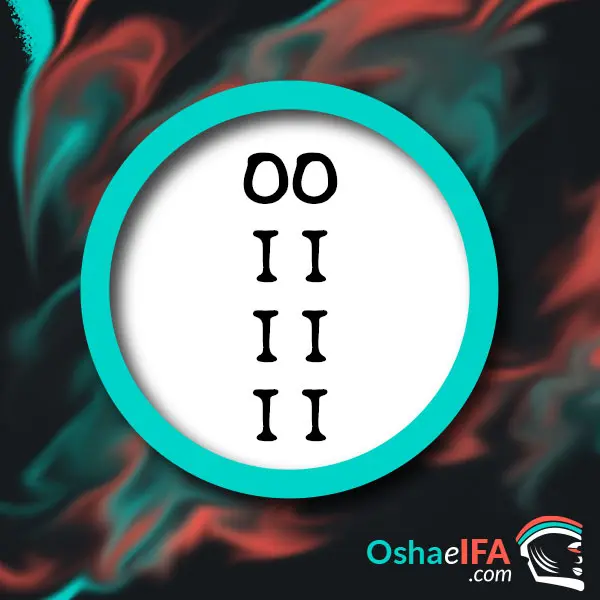
Osa Meyi is the spirit world. Speak Black Magic. When this Oddun goes out in divination for a client, he is told that he has enemies who are planning to harm him. If the client makes sacrifices to Shango, he will have greater strength and will defeat his enemies.
Those ruled by Osa Meji tend to lose control of life. It takes a lot of effort for them to focus on what they are doing and when it comes to their work.
What is born in the odu of Ifa Osa Meyi?
- Sinusitis, adenoids and tonsils.
- The thighs.
- The openings of the eyes.
- The intestines and internal organs.
- Polyps in the uterus.
- Arthritis and dropsy.
- The venom of hairy spiders. (Tarantulas).
- Trade.
- The greeting between people.
- The jar in ruminants.
- The possession of the Orishas over people.
- The secret of cinnamon.
- Oshe: which symbolizes the virtue of Shango.
- The ritual staff. (Opa Oreré).
- Orúnmila's ritual machete. (Ada Osha).
- The red blood cell in the blood.
- The smell of the vulva in women.
- The Ashé de Shango.
What is the Osa Meyi sign talking about?
- Shango decides to adorn her necklace with white beads in honor of Orishanlá.
- Ori Deity must be received.
- Here: One of the Ituto ceremonies is revealed.
- This Oddun of Ifa rules the two ears, the two nostrils, the eyes, the arms and the legs.
- They were made: The Sun, The Stars. And it governs the relationships between the Earth and the Sun and between the Earth and the Moon.
- Orishanlá unconsciously helps the person.
- Speak Black Magic.
- Oshún gave his son to Yemajá to save him.
- It was where the ram could not eat corojo butter, it ate it and a ball came out in its stomach and it died.
- The injustice against the Priest of Ifá turns against the person.
- Osa Meyi is the Odu Isalaye of Iyami Oshoronga (Aje).
The Osa Meji sign points out:
- The diseases are: Weakness in all the body's defenses, vaginal parasites, tuberculosis, blood clots, blindness, bleeding from throat conditions, problems with the viscera, itchy skin, blood problems: diabetes, leukemia, hemoglobin problem ; bone diseases: arthritis, paralysis, rheumatism and osteoarthritis; polyps in the uterus, brain weakness, neurasthenia; chest conditions, adenoid, sinusitis, impaired menstruation,
hemorrhoids and ulcer. - The herbs are: cotton, cape jasmine, dried cundeamor, cochinera mallow, Ikin bush leaves, corojo, corn, melon, banana leaf and stem, mahogany, dead scarecrow and cinnamon.
You may also like: Shango, history and characteristics of this Orisha.
Recommendations of the Osa Meji sign:
For a woman desiring to have children, the sacrifice that Ifá prescribes should be indicated to her so that she can achieve them alive.
For a person who is ill, Osa Meyi recommends that he should sacrifice a goat to Ifá. From that goat the person must cook the viscera and eat them so that he can save his health. The meat of the goat must be given away and not eaten from it. In addition, he must serve Egun and receive Oduduwa.
Sacrifice to Eshu a rooster, a pigeon, different types of grains and a bag of money so that he will obtain prosperity, but once you achieve it, do not become vain, nor treat people with superiority, because you may lose everything overnight in the morning and being involved in justice situations that can land him in jail. Do not separate from Ifá and do not refuse to sacrifice, because your money may be lost on lawyers to avoid prison.
He must sacrifice two white roosters and a mariwó mallet to Shango, a dove to Ogue to avoid death caused by something thrown in his food, and he must not eat meals cooked by strangers.
This Odu "Osa Meji" reveals one of the many funeral ceremonies, called Ituto.
For a man who is the son of Shango, who dedicates himself to religious ceremonies, he will perform this activity frequently and successfully, since his religious knowledge will be put to the test, provided that he sacrifices for Shango what Orúnmila determines in divination. It is very possible for a sick person to die, since their days on Earth are numbered.
The secret of how Egun is lit candles is born. Because Ikú eats ram and how the table of the three months of a dead or deceased religious is prepared.
He has many enemies who do not let him prosper, make the sacrifice that Orúnmila determines. For a woman eager to have children, she must sacrifice before and after childbirth so that she can conceive her children and watch them grow to middle age.
You must not be stubborn and incapable, make the prescribed sacrifices to eliminate the danger of death that threatens you due to the large number of enemies you generate. Make sacrifice with two doves, seven needles, cotton ash and a bag of money to rid your business of three powerful enemies who will try to hinder your plans.
Sinusitis and adenoids, thighs, eye openings, intestines, internal organs, tonsils, polyps in the uterus, arthritis are born.
This Oddun rules the two ears, the two nostrils, the eyes, the arms, and the legs.
Here they were made: The Sun and The Stars and governs the relationships between the Earth and the Sun and between the Earth and the Moon.
Osa Meyi in Osogbo:
The children of this Odu "Osa Meyi" like to meddle in other people's affairs, they invent things out of the ordinary, they are like the wind, they have everything and lose everything, they are spiritualists, arrogant, they believe that they are always right, they do not hear advice, they are imperative and dominant, capricious and he likes to be followed by nothing but them.
They stop treating friends for assumptions, they have delusions of grandeur, they are deceivers in every way. Here speaks discredit and death from pride or stabbing wound. They are self-sufficient, unruly, and given to tragedy.
When this Sign comes Osobo for Iku, he must sacrifice a goat, a hen, a rabbit and a banana stem prepared as a coffin in order to live to old age.
Sign Osa Meji (9-9) in Ire:
Sacrifice a goat to Eshu and a goat Orúnmila so that you can succeed in a test where your knowledge and skill will be measured. Do not rush to find a partner or get married because in the frenzy of your search, your life will be at stake. Wear a red cap on your head.
The Sign of Ifa Osa Meji offers money, but poverty haunts the person.
Sayings of the Odu of Ifa Osa Meyi:
- No dress is longer than the one worn by Witches (Aje).
- White man like the albino, there isn't.
- Man is free like the bird in the cage.
- They call me a witch.
- You have to know how to swim and store your clothes.
- My dreams reveal my nights and my days.
- He who is going to catch a horse, who does not get on the road without carrying a mile.
- The Wind and the Witches.
- I'll sleep easy as long as I sacrifice.
- In any country I will be king.
- There is no wanderer more omnipotent than the wind.
- The sweet tooth who steals the food of another will be punished.
- The blind came and the lame left.
- The swift deer is the pride of the animals of the bush.
- The Rainbow is the pride of Heaven.
- Just as the Earth spins, it spins the Moon.
- The beautiful woman is the pride of the husband.
- Birds of a feather, they all fly together.
- The Moon and the Stars are the pride of the Sun.
- Friend himself kills his friend.
- Children are the pride of the mother.
- I fight alone against the world.
- Red feathers are the pride of the parrot.
- The day came, the night came, and the king graduated.
- Saliva prepares the tongue to speak better.
- The pelvis found shelter and crawled between her legs.
- If you sleep well on Earth, it will reveal its secrets to you.
- The elephant's eye lids are not toys for children.
- If you don't give your blood, you will give me your flesh.
- The accident will meet a woman dressed in red cloth on the long road
- The only daughter dove, separates the Earth from the sea and will return home alone.
- Air cannot beat a stone like a mat.
- The new leaves are the pride of the palm tree.
- The slender tree is the pride of the monkey.
- White flowers are the pride of the leaves.
- The stocked gallery is the pride of the patron.
Says Ifa Osa Meyi:
When this Osa Meyi appears in the Okpele or Ikin divination (in ordinary divination or daily consultations) the client should be advised:
For a woman: You will be told that after having several children, she will give birth to an albino who will demand respect from each and everyone.
When the Odu of Ifa Osa Meji is presented at the initiation divination of Igbodun, the initiate must be told that: He has started as an Ifá priest but will have problems with witches, so he will have to sacrifice a goat to Eshu, a banana to his Ifá and a dove to his head.
Never deny Eshu his favorite food (the goat) because he will run into all kinds of difficulties. To avoid serious problems in the stomach, liver, heart and intestine, caused by witches, you must sacrifice to the queen witch of the witchcraft cult Iyami Oshoronga a goat, a bottle of oil, white cloth and offer her cooked heart, liver, and intestines of the goat. You must make a tent with the white cloth and deposit the food inside it.
Ifa says in Osa Meyi: He must sacrifice a goat to serve his father's head, clay pot, oil, remains of the goat's meat, salt, divine powder, and he is given a candle in a bonfire in favor of the Witches, for his father to get better from an illness.
His mother is a witch who practices the cult of sorcery. Offer a goat to Eshu and with forest leaves wash his head. Also offer a goat to Orúnmila and another goat to Eshu in gratitude for coming to rescue him at a critical time.
When death prowls him, he must offer a goat to Eshu, a pig and a goat to Ifá, a rooster and a dove to Olokun and invite several Ifá priests and celebrate them.
Someone will lie against you and you will be accused of false testimony or other accused persons. For this, he must sacrifice a father ram, ten snails, a rabbit, a fish to Ifá. Beware of the children of Ofun-Meji and Irete-Meji, as they are your bitter enemies.
His wife plans to betray him with sorcery and create all kinds of problems for which you must sacrifice a goat to Eshu, a pig to Ifá, eight eggs and a castrated goat to the Witches and avoid all kinds of problems with sorcery.
To forever remove the threat of the witches, you must sacrifice a goat to Eshu, two black hens to Ifá and offer Las Brujas a rabbit, eggs, chicken, palm oil, salt, divine powder marking the Odu de Osa- Meji in a clay pot and pronounce the following incantation:
"I remind you that the offering belongs to Orúnmila and that you must remember the oath that you administered to your mother that fateful day, which saved her from all extinction."
This offering, which must be made by the children of Oddun Osa Meji, invariably constitutes the universal form of sacrifice to The Witches, or the cult of sorcery.
Prayer of the Odu Baba Osa Meyi:
OSA MEJI BABA BURU BURU BABA FOSHE FOSHE ADIFAFUN EWE SARAYEYE. SLIME
BURU BURU BABA FOSHE FOSHE ADIFAFUN ORUNMILA ONIBARA BANIREGUN ARE UNLO
NI SHANGO KAFEREFUN ESHU ALAKI EBORU ALAKI EBOYA ALAKI EBOSHISHE.
Suyere Oddun Osa Meji:
SARAYEYE BAKUNO SARAYEYE BAKUNO EBO ARENU
Ebbo of the Odu Osa Meyi Ifa:
For the enemies:
When the Awó has many bad eyes on him, he places a gourd with a banana hand inside in front of Shangó or Ogún and says this Odu and as those bananas are destroyed, his enemies will be destroyed.
Inshé of Osanyin oddun Osa Meyi 9-9:
A cotton bud, opens and is loaded with: lizard head powder, 3 marigold seeds, blue and white celestine grass (oriye and kotoriye), loses its way, honey, ringworm feather, 101 guinea pepper, black cuaba stick powder, jutía and smoked fish, roasted corn, mouse head. Everything is chalked in white thread and Obatala beads. It also carries land at twelve o'clock in the day and at twelve o'clock at night from the door of the house. He wonders if he eats male pigeon.
Work to marry by the sign Osa Meji:
Ebó will be made with: a rooster, a hen, an Eshu chicken, two dolls (male and female), an okra wreath, a metal machete, honey and other Ebó ingredients.
The heart of the Rooster with the generals of the woman. The one of the hen with the generals of the man in alcohol of 90º. Then they make separate powders to load the dolls. The dust of the heart of the rooster for the load of the male doll, and that of the hen for the female doll.
The rooster of the Ebó is given to Shango, the hen for Oshún with the crown. The chicken for Eshu. Two stones, one from Shango and one from Oshún, then the man or woman doing the work is given the two dolls and the two stones.
Against sorcery:
A wooden stick is taken and a wooden tray is inserted into the handle where Osa-Meji is painted, brandy is added and 101 guinea pepper is put on it and covered with cotton and on top is flour with butter. corojo. He gets behind the door of the house.
Advice from the oddun of Ifa Osa Meji (9-9):
Through this Odu of Ifa they face surprising changes, both at work and in personal relationships.
Osa Meyi emphasizes the need for spiritual help against bad dreams and sleeping witches.
Appropriate sacrifices must be made to appease the witches and ensure the necessary protection.
The Ifá priest of this sign should not eat food cooked by anyone. He should put it on Eshu asking him if he has something bad, to turn against whoever wants him bad, because he may die from something that is thrown into his food.
This Odu predicts to the priest of Ifá diabetes and insufficiency in the red blood cells that can cause a deterioration of the organism. In order to avoid this danger, in both cases you must make the following sacrifice: a white dove to Olorin (spirit of the head), Ipori (spirit that governs the extremities) and Ipejun (spirit that governs the viscera). Drink the blood of another pigeon, mixed with the divine powder of the Odu and the juice of the leaf of the Ikin bush. Take the body of both pigeons and put them on top of a fire and inhale the smoke that emanates from them. In addition, a black goat is offered to Eshu.
Here a goat must be sacrificed to Eshu, coal and corojo butter, a millet broom to Orishanlá and a rooster to Shango so that he can improve his economic situation. You should not complain about your luck, because despite the obstacles you will achieve prosperity with the help of someone who esteems you and lives far from you.
In this Odu, Shango decides to adorn her red necklace with white beads in honor of Orishanlá.
Sacrifice a goat to Eshu and two chickens to Ifá and serve your head with kolá nut so that you do not lose everything you have and can receive an inheritance that is planned for you.
Always listen to the advice of your father and do not refuse to sacrifice, because your heads may lose you. He must sacrifice six pigeons, six kolá nuts and six yams to Orúnmila in order to emerge successfully from a war in which he is immense or that is looming. Do not trust your position or strength, because the enemy can defeat you if you do not make sacrifice.
Sacrifice a goat, a rooster, a ball of money to Eshu and two chickens to Ifá so that you can solve your problem, because it is possible that you will go through a test from which you leave ashamed and lose your prestige for not having made the offering and when it is decide to make it lose more money on it than you thought.
Listen to people who advise for your good even if they are children, because you can lose a good just because of your arrogance.
You have to receive the Ori Inu deity or personal deity so that you can move towards success.
In addition, he must consult Ifá regularly and attend and do what is prescribed.
Meaning of the Sign of Ifa Osa Meyi
In a temporary divination, the person would very soon face changes both at a personal and work level or in relationships. Possible changes of address.
It indicates a special meaning of time and space within the context of the Universe.
It represents the world of spirits, where the afterlife and the work of souls were created after the matter in which they have inhabited was destroyed.
The children of this Odu tend to lose control in daily attitudes
It is an Odu where you have a great capacity for business, where the vision of material issues are innate in those born under Osa Meyi. They were born to run companies to be the right hand of an employer.
Those born under this Odu will travel a lot and will have the opportunity to know different lands and different philosophies.
Oddun Osa Meji tells us that his children are very worried people and perhaps because of their very fearful concerns
There are times when Osa Meji is required to have more courage and fight the opposition, since the propensity to give up in the face of difficulties in most cases is detrimental. They are highly impressionable.
A well-controlled Osa Meji will have the ability to fight the tendency to abandon projects and goals to follow. He will put all his tenacity at the service of taking his abilities to the end.
In this Oddun you are urged to seek spiritual help.
If the person's picture is wrong, they will have a tendency to have negative influences and possibly their sleep is not calm or restorative.
The influence of this negativity should be given through sacrifice.
The Ayés should be appeased with their own sacrifices, sweet tobacco fruits, spirits, eggs etc ...
Seek protection.
It is said in this sign that the person born under its influence should be very attentive in terms of sacrifices, since it has many detractors against whom it is necessary to put means and get out of their way so as not to lose the fight.
He must always have as a reference to Shango, the Deity who always watches over him. Sacrifice is advised for maturities should increase vigor, strength and confidence, through connection.
It is a female Odu. Its sign is Air. She is the daughter of Euje and Ogue. Day of the week Oju-Oti (Friday). Ruling planet: Olare (Venus). Copper metal. Colors to dress: green and brown.
Osa Meyi means: "Air", "Vain Thing". It governs the relationships between the Sun and the Earth, and between the Earth and the Moon.
This Odu is the one empowered to call the other Odus on the Ifá board.
It is the realm of Spirits. Represents the female domain.
In this Oddun of Ifa the Black Magic speaks.
Osa Meyi (9-9) gives money, but poverty haunts the person.
This Ifá returns evil and punishes those who sow discord. Osa-Meji survives and buries her siblings.
The woman daughter of this Sign of Ifa dies from prostitution.
This Odu implies courage, the flight from the struggles.
Ifa Osa Meyi Oddun Treaty
Mayors were born. This Odu represents time. Here Orishanlá unconsciously helps the person. Do not collude with anyone because you will always lose.
The spirit of Osun in this Odu is called Agagani Gagalo (the one who rules in the animal kingdom).
The greeting between people is born. Ruminant jars.
In general, it marks treason, travel, prison, falsehood and family envy. The family is the worst enemy of the person.
The possession of the Orishas over people was born. The secret of cinnamon.
Here Oshún gave his son to Yemajá to save him. Here the mother, to save her son and not pass the work that she is going through, gives him to someone else to raise him.
In this Odu, the person goes to the seashore with a bouquet of flowers and tells Yemajá his sorrows without asking for anything. The flowers are left there and their help is expected.
This was where the ram could not eat corojo butter; he ate it and a ball came out in his stomach and he died. You don't eat corojo butter. You have to be careful of kneeling or foreign objects in your sight, as you can go blind.
Here the injustice that is committed with the Ifá priest turns against the person who performs it.
This Oddun "Ursa Meji" marks neurasthenia, diseases in the bones, blood, chest, itchy feet, paralysis, osteoarthritis, retention of menses, consumption, hemorrhages, throat disorders, ulcers, hemorrhoids.
This Odu commands you to organize yourself in your life to prosper.
The sign of Ifa Osa Meyi represents feminine dominance over man.
In this Ifá the woman can die from coquetry. Do not eat pigeons. Here the deity Oshe was born, symbolizing the virtue of Shango.
Sacrifice to witches is recommended to divert their attention from the person and the imminent prospect of danger.
The Opa Orere, a ritual staff, and the Adá Osha, Orúnmila's ritual machete, was born, equipped with an interior rattle.
The wife of this Odu suffers from vaginal parasites that eat the sperm, so she does not get pregnant.
Osa Meji is the Oddun empowered to summon the various Odus on the board when sacrificed. The Red Blood Cell is born in the blood.
The spirit that inspired men speaks. The trees are fed and the entrails are put to him as offerings.
Ifa code of ethics of the odu Osa Meji:
All human beings are the same.
Pataki of the sign of Ifa Osa Meyi:
Where the pigeons made Shango sick.
Shango was called Alufina Akakamasia, he lived in the Onibu Odé land and was feared and respected by all, but he had many hidden enemies who tried to eliminate him. Among his many hidden enemies was one of his close friends called Gbonko, who wanted to supplant him in the government of the land Onibú Odé, and since he knew that Shango was crazy about pigeons, he prepared an Afoshé and blew it on the pigeons and the birds. spell.
When Shango ate a dove, he became seriously ill, so he ordered his servants to take him to Orúnmila. In the Osode this Ifa came out and told him: -Ifá says that you ate a meal that disliked you because of a powder (Afoshé) that they threw on it.
Do not eat that type of food anymore and put a guardian to eat it for you, you also have to make Ebó with: Two white roosters, a mariwó mallet. (The Ebó is to put it on the road where you have to
pass your enemy).
Shango did everything as instructed and when Gbonko passed, he stepped on the Ebó and died. Then Alufina Akakamasia called his faithful servant, who was Ogue, and put him as a gatekeeper to eat the doves that were sent to him, since Ogue had the power against sorcery and nothing could harm him.
And since then Ogue has eaten pigeons for Shango.
Note: The Awó of this Odu should never eat the meals sent to him by outsiders, he should put them on Eshu telling him that if something bad has it, he should turn against the one who sent it.
Osa Meji Ifa Traditional Nigerian
ÒSÁ MÉJÌ
Ó Sáá méjì lákòjà
Ó bu yekeyékè lójú Opón
A day fún Olúkòso làlú
Bambí Omo a rigid ota segun
Èyí tí or gòkè àlàpà according to òtá è
Ebo n won ni or se
Ó yes gbébo nbè
Ó rubo
Njé kin lÀrìrá e sétè?
igba ota
N lÀrìrá e setè
Igba ota.
Ifá exhorts this person to make sacrifice so that he can prevail. He must be a devotee of Sàngó. He will see the end of his enemies.
Ó Sáá méjì lákòjà
Ó bu yekeyékè lójú Opón
They made divination for the Olúkòso làlú
Bambí Omo a rigid ota segun
The one who would scale a ruined mud wall to defeat his enemies
It was the sacrifice they advised him to offer
He heard about the sacrifice
And he did it
What had Àrìrá used to win the war?
Hundreds of bullets.
It is what Àrìrá had used to win the war
Hundreds of bullets.
The 16 Meyis of Ifa:
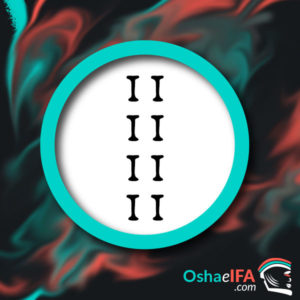




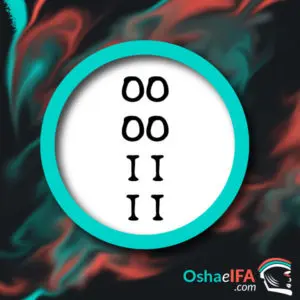
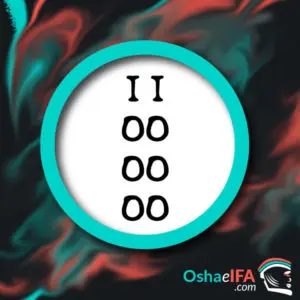
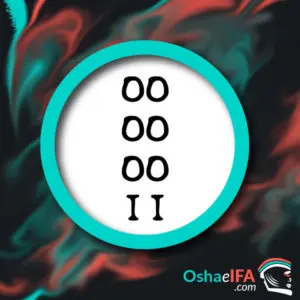
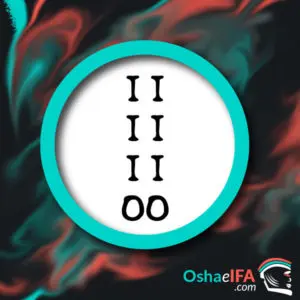
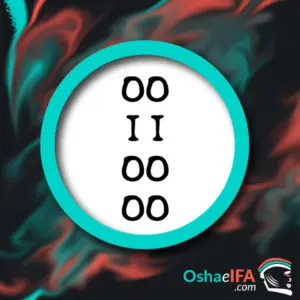
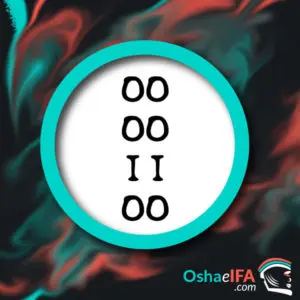
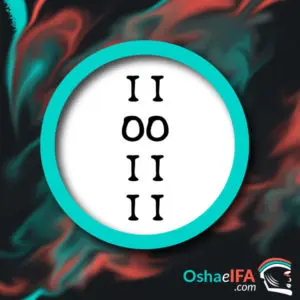
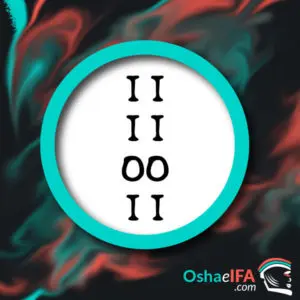
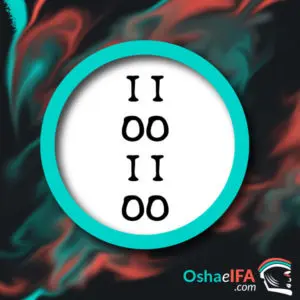

Hello, what is osa meji's eshu?